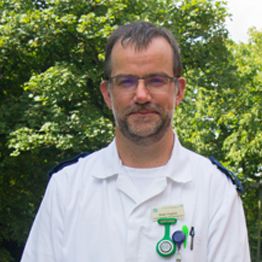Pain Management
About
The Royal Orthopaedic Hospital Chronic Pain Service is a well established service for people who have long-standing pain. Because pain impacts on many aspects of people’s lives, pain management is a multi-disciplinary approach. Our service offers comprehensive and individualised care that goes beyond just medication, aiming to improve the quality of life, restore function, and address the physical, emotional, and psychological aspects of chronic pain.
The pain management service includes pain nurse specialists, consultants in pain medicine and anaesthetics and a psychologist.
If you feel that you need support form a pain management service, please speak to your GP.
What is Chronic Pain?
Chronic pain is a difficult condition to manage and the concept of ‘no cure’ can been difficult to accept. Our aim is to help you manage this condition.
We have devised a short video clip that can help you understand your journey, medical team involved in your care in the chronic pain clinic and some of the tools you need to manage your pain. It may be useful for you to share this video with those close to you including your family and friends, to help them understand chronic pain too.
Ways to manage chronic pain
Choose an exercise that won't put too much strain on yourself. Good options include:
Activity and stretching needs to become part of your lifestyle so you routinely do exercise a little and often. Try to be active every day instead of only on the good days when you're not in so much pain. This may reduce the number of bad days you have and help you feel more in control.
But try to avoid overdoing it on good days and paying for this by having more bad days. Try these flexibility exercises and sitting exercises you can do at home.
It's important to try to stay in work even if you're in pain. Research shows that people become less active and more depressed when they don't work.
Being at work may distract you from the pain and might not make it worse. Talk to your supervisor or boss if parts of your job are difficult to begin with, but stress that you want to be at work if that's the case.
If you have been off work for 4 to 6 weeks, plan with your doctor, therapist or employer how and when you can return. You could go back to work gradually. For instance, you might start with 1 day a week and gradually increase the time you spend at work. You could also agree changes to your job or pattern of work if it helps – a health and safety rep or occupational health department may be useful.
More information:
https://versusarthritis.org/about-arthritis/work-and-arthritis/
https://healthtalk.org/experiences/chronic-pain/unemployment-and-returning-work-chronic-pain/
Pain experts often recommend a short course of physical therapy. This helps you to move better, relieves your pain, and makes daily tasks and activities easier, like walking, going up stairs or getting in and out of bed. Physical therapy for persistent pain can involve manipulation, stretching exercises and pain-relief exercises. Physical therapy is usually delivered by a physiotherapist, chiropractor or osteopath, or in some cases, an occupational therapist.
Physiotherapists can give you advice on the right type of exercise and activity. Occupational therapists can support you with environmental changes that can help you remain in work and function better at home. If you have physical therapy, you should begin to feel the benefits after a few sessions.
If you struggle with persistent pain, it is very likely that you have taken various pain medicines and anti-inflammatory drugs to help you manage it. Unfortunately, the success of using these drugs for persistent pain problems can be limited. Prolonged usage can cause the body to become tolerant to the drugs and hence less effective. If medicines are used, they should be used in combination with other strategies such as self-management approaches.
If you would like to explore ways to make changes to your medication or to gradually reduce or stop your pain medications, speak to your GP or the Pain Management Service if you are already under our care. Please note that any changes should be made gradually and under guidance of a medical professional.
More information:
https://livewellwithpain.co.uk/practitioner-resources/10-footsteps/medicines-and-nutrition/
Brainman stops his opioids: https://www.youtube.com/watch?v=MI1myFQpdCE
This website is all about learning new approaches and skills to help you live well, despite your persistent pain. There tools and resources are tried and tested – many are now regularly used across the NHS to help people to learn how to self-manage their pain.
Flippin pain is a public health campaign that aims to raise awareness challenge misconceptions and empower people with persistent pain. It offers events, resources and a formula to help.
Rethinking Pain is a new community-based pain service for people who live with long-term pain, which is pain that lasts for more than 12 weeks. They have a useful YouTube channel with lots of videos with chair-based exercises, relaxation and diet therapy.
Pain toolkit is a website and academy by Pete Moore, who lives with persistent pain and offers workshops, books, AI and VR to help people cope with pain.
Versus Arthritis provide support for people living with arthritis across the UK. They aim to bring you the most up to date evidence-based information and developments on arthritis and rheumatology, based on the latest research and medical information.
A supportive community where people living with persistent pain can find resources and pain management guidance in a safe environment. Their mission is simple: to provide support to people who are grappling with the challenges of chronic pain, by providing a safe space to share experiences and gain access to valuable resources.
Meditation can be a powerful tool in chronic pain self-management because it helps to calm the nervous system, reduce muscle tension and either shift attention away from pain sensations or focus attention on body sensations in a non-judgemental and curious manner, rather than with fear.
Over time, meditation can help to increase resilience, help with sleep, reduce anxiety and emotional distress, and support a greater sense of control and well-being.
More information
ROH B2L Tension Reduction Meditation and 7/11 breathing
BBC 3 - The Music and Meditation
Cumbria, Northumberland, Tyne and Wear NHS Relaxation Techniques
Learning about the science behind Chronic Pain
Living with long-term pain can feel confusing, frustrating, and sometimes frightening. Understanding how pain works in the body and brain can make a big difference.
- Pain doesn’t always mean damage
Sometimes the nervous system becomes sensitised, so it keeps sending pain signals even when the body is safe. This means you can feel real pain even if scans or tests don’t show new injury.
- Knowledge reduces fear
When pain feels mysterious, it’s easy to worry that movement or activity will make things worse. Learning the science of pain helps reduce fear and shows that gentle activity is usually safe and helpful.
- You have more control than you think
Your brain and body can change — this is called neuroplasticity. Things like movement, breathing, relaxation, and stress management can calm the nervous system and reduce pain.
- You’re not “imagining it”
Pain is always real. Understanding how the nervous system works helps explain why pain can continue even without ongoing injury. Many people feel relief knowing their experience is valid.
- It builds confidence in recovery
When you know why therapies like exercise, pacing, sleep routines, and relaxation are recommended, it’s easier to stick with them. Over time, this helps you feel stronger and more in control.
More information
We offer a 6-week Pain Management Programme which is facilitated by a multi-disciplinary team which includes a pain nurse specialist, physiotherapist and psychologist.
Find out more about this programme: Royal Orthopaedic Hospital - Pain Management Programme
The Self-Management workshop is a half-day course designed to give you information about self-management skills that enable you to live a more fulfilling life, despite the presence of pain. You will learn a range of self-management skills and techniques to help you manage pain in more helpful ways. This workshop gives you information about a combination of physical, practical and psychological approaches to better manage your pain and improve your quality of life.
Find out more: Royal Orthopaedic Hospital - Self-management Workshop
Living with chronic pain impacts on all aspects of life and can cause distress. In addition, patients living with chronic pain may also experience anxiety and depression. Please do not suffer in silence. Talking to someone else is the first step.
Find out if your GP has a Social Prescriber. Social Prescribing supports referrals for a range of local, non-clinical services that support health and wellbeing. Your GP practice may have a link worker that can connect you to relevant community groups and services for practical and emotional support.
Information about conditions, treatments and more




